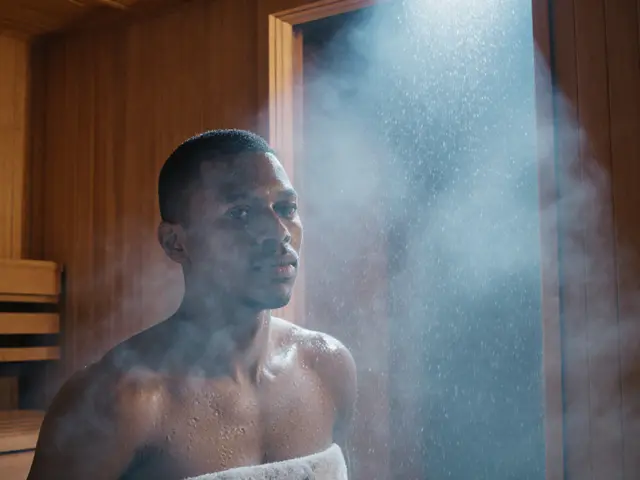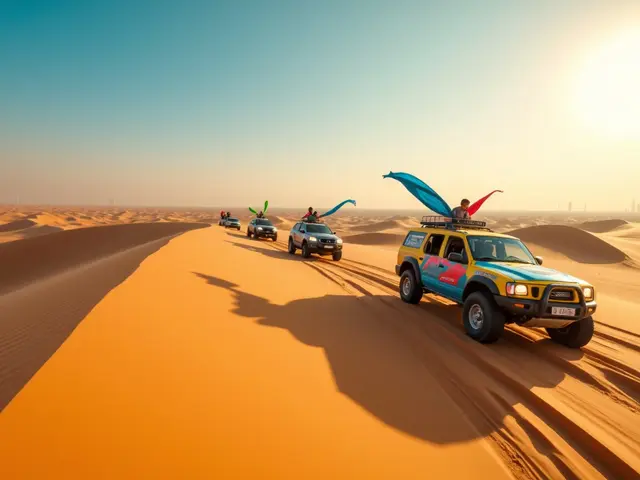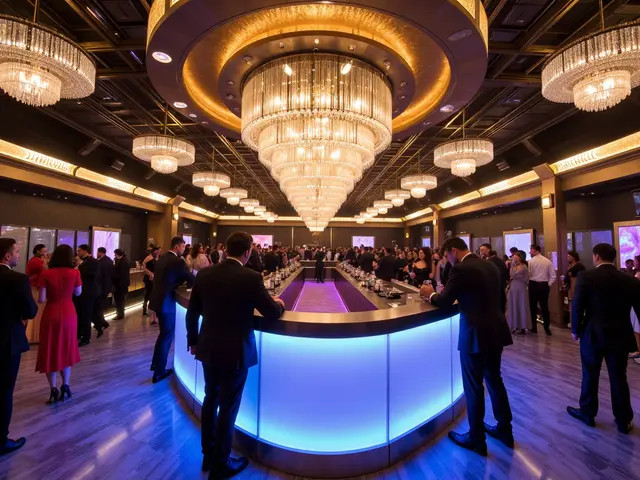You land in Dubai. The airport is sleek, the air is dry, and everyone around you is speaking a mix of languages you don’t recognize. Your stomach drops. Can you speak English in Dubai? The short answer? Yes-easily. But there’s more to it than just a yes or no.
Quick Takeaways
- English is the unofficial second language of Dubai and used in nearly all public services.
- You’ll hear Arabic as the official language, but most locals and workers speak fluent English.
- Signs, menus, ATMs, and metro maps are almost always in both Arabic and English.
- Tourists rarely face language barriers-unless they wander into very local, non-tourist areas.
- Learning a few basic Arabic phrases is appreciated but never required.
Can You Speak English in Dubai? Yes-And Here’s Why
Dubai isn’t just a city. It’s a global hub where over 200 nationalities live and work. More than 85% of the population are expats, and English is the common glue holding daily life together. You won’t find a single ATM that doesn’t have an English option. You won’t walk into a hotel lobby without someone greeting you in clear, fluent English. Even the guy selling you a shawarma at the corner stall? He’ll probably answer your question about spice levels in English.Arabic is the official language, sure. But in practice, English runs the city. Government offices, hospitals, schools, malls, and even the police force use English as their working language. You can check into a hospital, file a complaint, book a flight, or ask for directions-all in English.
And if you’re worried about accents? Don’t be. People here have learned English from British, American, Indian, Australian, and Filipino teachers. You’ll hear all kinds of accents-some thick, some light-but almost everyone speaks clearly and patiently. I’ve seen tourists from Japan, Brazil, and Russia navigate Dubai without knowing a single Arabic word. They didn’t struggle. They just asked.
What About Signs, Menus, and Public Transport?
Everything you need to get around is bilingual. Metro stations? Arabic and English. Bus numbers? Arabic and English. Exit signs? Arabic and English. Even the little stickers on elevator buttons? Arabic and English.Menus in restaurants? Almost always in English. If there’s Arabic, it’s usually just a decorative touch. The prices, ingredients, and descriptions? All in English. You’ll never be stuck staring at a menu wondering if “lamb kofta” is meat or a dessert.
The Dubai Metro app? Available in English. The RTA (Roads and Transport Authority) website? Fully in English. Even the traffic police officers who pull you over? They’ll ask for your license and insurance in English. No need to memorize Arabic traffic terms.
Where You Might Hit a Language Snag (And How to Avoid It)
There are places where English isn’t as common-but they’re rare, and easy to avoid.If you wander into a tiny local grocery in Deira or a family-run spice shop in Bur Dubai, you might find someone who speaks little English. But even then, they’ll usually have a phone open to Google Translate, or a younger family member nearby who can help. Most of these places are used to tourists. They expect it.
The only real risk? Trying to talk to someone who’s been in Dubai for less than a year and doesn’t speak English yet. These are usually new workers from Bangladesh, Pakistan, or the Philippines. They’re not rude-they’re just learning. If you see someone struggling, smile, point, or pull out your phone and type your question. They’ll appreciate the effort.

Why English Works So Well in Dubai
Dubai was built for business. It’s not a city that grew organically-it was planned as a global crossroads. That means from day one, infrastructure had to work for people from everywhere. English became the default because it’s the language of international trade, tourism, and tech.Even the Emiratis themselves are fluent. Most young Emiratis grew up in English-medium schools. They watch American TV shows, play global video games, and study at universities in the UK or US. Many speak English better than Arabic.
And here’s something most people don’t realize: Dubai doesn’t just tolerate English-it encourages it. The government runs English-language public campaigns. Billboards, public service announcements, even the ads on the metro-all in English. Why? Because they want visitors to feel welcome. They know tourism drives the economy.
What to Say (and What Not to Say) in English
You don’t need to be a grammar expert. But a few simple things help:- Use “please” and “thank you.” It goes a long way, even if you’re speaking English.
- Don’t raise your voice. Loudness is seen as aggression here, even in English.
- Be direct but polite. “Where’s the nearest pharmacy?” works better than “Hey, where’s that thing?”
- Don’t assume everyone speaks American English. Some people use British spellings (“colour,” “lift,” “biscuit”). It’s the same thing.
And if you accidentally say something awkward? No big deal. People here are used to foreigners making mistakes. A smile and a shrug will get you further than any perfect sentence.
Is Arabic Useful at All?
Not for survival. But if you learn just three phrases, you’ll stand out in the best way:- Marhaba (Hello)
- Shukran (Thank you)
- Min fadlak (Please-said to men; Min fadlik for women)
When you say these, even badly, people light up. It’s not about being fluent-it’s about showing respect. I’ve seen tourists get free upgrades, extra samples, and warm smiles just for trying.
But here’s the truth: if you don’t learn any Arabic, you won’t miss out. You won’t be ignored. You won’t be turned away. You’ll be perfectly fine.
Real-Life Example: A Tourist’s Day in Dubai
Meet Sarah. She’s from rural Ohio. She doesn’t speak another language. She landed in Dubai with one fear: “What if I can’t ask for help?”Here’s her day:
- At the airport: She asked for a taxi in English. The driver nodded, loaded her bags, and chatted about the weather in Ohio.
- At her hotel: She checked in using an English kiosk. The front desk agent gave her a map with English labels.
- At the mall: She bought a dress, asked for a size change, and got it without a problem.
- At a café: She ordered a latte with oat milk. The barista asked if she wanted it hot or iced-then laughed when she said “both.”
- On the metro: She used the app to find her stop. The voice announcement was in English.
- At dinner: She asked the waiter if the food was spicy. He said, “Very,” and showed her a picture on his phone.
She didn’t say one word of Arabic. She didn’t need to. She had a great day.

What If You’re Traveling With Kids or Elderly Relatives?
No worries. Dubai is one of the most tourist-friendly cities on Earth. Hospitals have English-speaking staff. Pharmacies have bilingual pharmacists. Even the playgrounds in parks have signs in English.At Dubai Mall, you can find family restrooms with English instructions. At the Dubai Frame, the audio tour is available in English. Even the camel rides in the desert? The guides explain everything in English.
If your relative has trouble hearing or speaking, just use your phone’s translation app. Most people here are used to it. They’ll wait. They’ll smile. They’ll help.
Comparison: English in Dubai vs. Other Popular Tourist Cities
| Location | English in Public Spaces | Signage Bilingual? | Service Staff Speak English? | Language Barrier Risk |
|---|---|---|---|---|
| Dubai | Very high-used in all major services | Yes, everywhere | Almost always | Very low |
| Paris | Moderate-common in tourist areas | Mostly French only | Some, especially in hotels | Moderate |
| Tokyo | Low-limited outside major hotels | Mostly Japanese | Only in tourist spots | High |
| Rome | Moderate-tourist zones only | Italian with some English | Variable | Moderate |
| Barcelona | High in tourist areas, low elsewhere | Spanish and Catalan, some English | Depends on location | Medium |
Dubai wins by a landslide. You won’t find another city this size where English is this universally accessible.
Frequently Asked Questions
Do I need to learn Arabic to visit Dubai?
No, you don’t need to learn Arabic. English is spoken everywhere you’ll go as a tourist or expat. You can live, work, shop, and travel in Dubai without speaking a single Arabic word. But learning a few phrases like "Shukran" (thank you) or "Marhaba" (hello) will make people smile and may even earn you small perks.
Can I use English in hospitals and police stations?
Yes. All government hospitals, clinics, and police stations have English-speaking staff. Emergency services respond in English. If you’re in a medical emergency, just say "I need help" in English. Someone will understand and assist you immediately.
Is English used in schools and workplaces in Dubai?
Absolutely. Most international schools teach in English. Even many local schools now use English for science, math, and technology. In workplaces, English is the default language for business, emails, meetings, and contracts. You’ll rarely see Arabic used in corporate settings unless it’s for legal documents.
Are there areas in Dubai where English isn’t spoken?
Very few. Even in older neighborhoods like Al Ain or parts of Deira, you’ll still find English spoken by shopkeepers, taxi drivers, and service workers. The only places you might struggle are remote villages outside the city or among very new arrivals who haven’t learned English yet. But even then, help is always nearby.
What if I’m not a native English speaker? Will people understand me?
Yes. Dubai is full of people who speak English as a second, third, or even fourth language. Whether you’re from Brazil, India, or Germany, your version of English will be understood. People here are used to different accents and grammar. Just speak clearly, and don’t be afraid to repeat yourself. Most will be happy to help.
Final Thought: You’re Already Set
You don’t need to stress about language in Dubai. The city was designed for people like you-travelers who want to explore without barriers. English isn’t just common here. It’s the backbone of daily life.So pack your bags, bring your curiosity, and go. You’ll find that the only thing harder than speaking English in Dubai is finding a place that doesn’t speak it.






